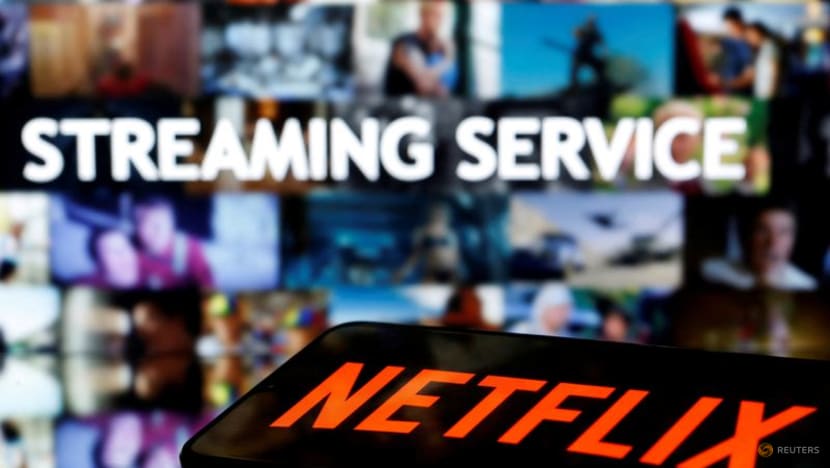Netflix expands password-sharing crackdown worldwide
Netflix's new policy on password-sharing covers customers in more than 100 countries and territories, including the US, Britain, Singapore and Australia.

A smartphone with the Netflix logo lies in front of displayed "Streaming service" words in this illustration taken Mar 24, 2020. (File photo: REUTERS/Dado Ruvic/Illustration)
Netflix on Tuesday (May 23) expanded its crackdown on password sharing to the United States and more than 100 other countries, alerting users that their accounts cannot be shared for free outside of their households.
"A Netflix account is for use by one household," the company said in a statement.
The streaming video pioneer has been looking for new ways to make money as it faces signs of market saturation, with efforts including limits on password borrowing and a new ad-supported option.
Netflix on Tuesday said it was sending emails about account sharing to customers in 103 countries and territories, including the United States, Britain, France, Germany, Australia, Singapore, Mexico and Brazil.
The emails state that a Netflix account should only be used in one household. Paying customers can add a member outside of their homes for an additional fee. In the United States, the fee is US$8 per month.
Members can also transfer a person's profile so the user can keep their viewing history and recommendations.
Netflix said early this year that more than 100 million households had supplied their log-in credentials to friends and family outside their homes, "impacting our ability to invest in great new TV and films".
As of the end of March, Netflix's paying customers totalled 232.5 million globally.
The company has experimented in a few markets with "borrower" or "shared" accounts, in which subscribers can add extra users for a higher price or transfer viewing profiles to separate accounts.
Under the new policies, people within the same household can continue sharing a Netflix account and can use it on various devices when travelling, the company said.
ENTICED BY ADS?
Netflix told financial analysts recently that it had delayed a broad crackdown on password sharing "to improve the experience for members".
Netflix said it made sure subscribers have seamless access to the service away from home or on various devices such as tablets, TVs or smartphones.
"They are just trying to reduce theft of their service," independent tech analyst Rob Enderle of Enderle Group said.
He reasoned that Netflix likely pays royalties when subscribers watch some shows or films on the platform, so non-paying viewers could add to the service's expenses while not contributing to revenue.
"In theory, Netflix loses money because they are paying royalties and people are getting the shows for free," Enderle said.
"It makes no sense for Netflix to allow that to continue."
Netflix in April said its subscriber numbers hit a record high 232.5 million in the first quarter of the year and that its nascent ad-supported tier was faring well.
The company said in a recent presentation to advertisers that it had more than five million subscribers to its ad-support tier.
The launch of an ad-subsidised offering around the same time as a crackdown on password sharing is no coincidence, reasoned Insider Intelligence senior analyst Ross Benes.
"People who freeload, as well as those who choose cheaper advertising tiers, tend to be price-sensitive customers," Benes told AFP.
"For the freeloaders who get booted, the cheaper ad tier will be an attractive option."
Getting people viewing for free to sign up for the Netflix ad tier would improve its appeal to advertisers, Benes added.
But there is also the risk that people no longer getting Netflix free will opt to "glom onto their friends' and families' Prime Video, Disney+, or Max instead", Benes said, referring to rival streaming services.
For the first time ever, US adults will spend more time this year watching digital video on platforms such as Netflix, TikTok and YouTube than viewing traditional television, Insider Intelligence has forecast.











